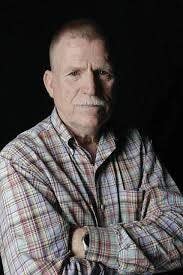Joe Todd: An interview with Roger Weil, Part 5

Oklahoma historian Joe L. Todd interviewed Roger Weil on Dec. 17, 2018 in Copan. This is the fifth and final installment of that interview.
T: When did you come to Copan?
W: Been here six years.
T: Why did you come to Copan?
W: One of my friends I worked with owned this house and my son owned a place nearby. I was down here and ran into the guy I worked with and I told him my son lived behind him. I came over here to visit with him and he said he was thinking about downsizing. About six or seven months later, I was getting ready to come down here to go fishing and the phone rang and he told me I needed to come by. I came by and he put a price on it and I bought it. I sold the place in Kansas and here we are.
T: Would you join the Army again?
W: No, I didn’t join, they would have to draft me.
T: I’d like to do a word association. I’ll give you some words and you give me your reaction.
W: All right.
T: The first one is Basic Training.
W: Not much.
T: AIT.
W: Not much different from Basic Training. We got up early in Basic Training because there were a lot more of us and a lot more to cover. Sheridan School was like going to college. We got up and went to class.
T: Sheridan.
W: A fine machine.
T: Vietnam.
W: A place I never want to visit.
T: Operation Lon Son.
W: A bloody mess.
T: Sergeant Hudson.
W: I would like to know what happened to him. He was a grand guy.
T: Ho Chi Minh.
W: I don’t know too much about Ho Chi Minh but he was the leader over there. The one I knew the most about was that general with one arm. I saw him several times and don’t know what his name is. He was a North Vietnamese general. They have him on television every now and then.
T: Lyndon Johnson.
W: If Lyndon Johnson had run, we would have never would have lost that war. There is a lot of propaganda they have now on Lyndon Johnson.
T: Richard Nixon.
W: Coward.
T: How do you want to be remembered?
W: I want to be remembered as a hard worker and an honest man.
T: Where did you meet your wife?
W: Coffeyville, riding down the street.
T: When did you get married?
W: March 28, 1975.
T: What is your wife’s name?
W: Oleta.
T: Anything else you want to talk about?
W: There are some things I just would not rather talk about. I went to the VA and psychiatrist read my paper and said he would not ask me any questions about Vietnam but he asked me other questions. Another psychiatrist asked me about Vietnam and she asked, “How did you survive all these years?” I told her I survived because I believed in myself. I told her I thought about taking the easy way out. She said that I had PTSD. When I came home, I went several years with headaches.
T: How many ambushes were you in?
W: Five.
T: What was the worst one?
W: That last one or the next to the last one. I don’t like to talk about it. There was nothing I could do.
T: Where did that happen?
W: That was on the Yellow Brick Road up on a ridge. It was toward the end of March or the middle of April. The question in the squadron was who was going to lead. They decided that 1/9 would lead, they brought us out and they will take us back. We had the most powerful tank and we were pulling a PC behind us. We hit QL9, the road to Dong Ha and we headed out at top speed pulling that PC.
T: What happened to the other Sheridan’s?
W: 1/7 got blown up. It heated up and blew up.
T: Sir, this is an excellent interview. I want to thank you for your service and thank you for the interview.
W: Thank you.
This article originally appeared on Bartlesville Examiner-Enterprise: Joe Todd: An interview with Roger Weil, Part 5
